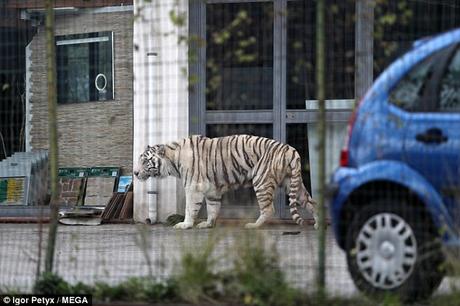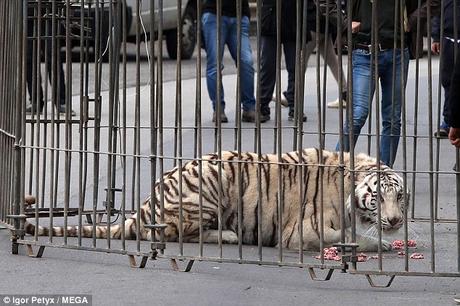 Away on the roads of
Sicily, a Bengal tiger caused mass panic after escaping form a travelling
circus. The predatory beast escaped its captors in Monreale, where it managed
to flee to outside people's homes. Members of the public took refuge inside
buildings as the emergency services scrambled to cage the big cat. With an
interested crowd gathered, circus staff and armed police managed to cage the
escaped animal.
Away on the roads of
Sicily, a Bengal tiger caused mass panic after escaping form a travelling
circus. The predatory beast escaped its captors in Monreale, where it managed
to flee to outside people's homes. Members of the public took refuge inside
buildings as the emergency services scrambled to cage the big cat. With an
interested crowd gathered, circus staff and armed police managed to cage the
escaped animal.
 If you ever thought that
keeping animals caged is cruel, read on some more - The Human Zoo is a book written by the
British zoologist Desmond Morris, published in 1969. It is a follow-up to his
earlier book The Naked Ape; both books examine how the biological nature of the
human species has shaped the character of the cultures of the contemporary
world. The Human Zoo examines the nature of civilized society, especially in
the cities. Morris compares the human inhabitants of a city to the animal
inhabitants of a zoo, which have their survival needs provided for, but at the
cost of living in an unnatural environment. Humans in their cities, and animals
in their zoos, both have food and shelter provided for them, and have
considerable free time on their hands. But they have to live in an unnatural
environment, and are both likely to have problems in developing healthy social
relationships, both are liable to suffer from isolation and boredom, and both
live in a limited amount of physical space.
The Human Zoo is different
and sadly was a reality as reported in this news item in ABC (www.abc.net.au)
Up to 20 Aboriginal people
were taken from northern Australia in the 19th & 20th centuries to be exhibited alongside animals in
what was called The Human Zoo. Along with tens of thousands of other people,
they were put on display across Europe and North America until at least 1940. Today
Rottnest Island is a popular holiday spot, but few realize the island's dark
past as a prison for Indigenous men. Palm Island elder Walter Palm Island said
it was a privilege to meet the remains of an ancestor, found mummified in North
America, back on home soil.
"Looking at the
images and pictures of the ancestors, I can see the pain and suffering they had
in the expressions on their face. And how degraded they were – explained one
and added "They lost a lot of their self-esteem and confidence in
themselves as human beings. They were treated as animals."Mr Palm Island's
ancestor died in the late 19th century — he was one of about 35,000 people
who were exhibited in human zoos between the early 1800s and World War II. "They
were displayed as cannibals. Man eaters. The missing link between man and
monkey, for audiences in search of exoticism and the thrill of the unknown,"
he said.
Philip Rang, an Australian
cinematographer, is working on a documentary that retraces some of these human
stories and has just returned from filming on Palm Island. He said about 20
Aboriginal people were taken from there and Ingham in north Queensland. "They
first got loaded up in Townsville and taken down to Sydney. And so they
wouldn't escape, they were stripped of all their clothes and put on a
boat." The human zoos also exhibited people from Africa, the Pacific and
Asia. Mr Rang said it was a justification for colonization. "They would
travel to faraway lands and say look at what we discovered. Not only have we
found spices and herbs and raw materials, but we also found these
peoples."
One of the documentary's
directors, hopes it will discourage a
repeat of history. "It was the way
to justify the domination of the world. These people victim of that. But we
don't want to make a political film, we just want to give the facts and tell
the story of these people who were completely forgotten."
For Mr Palm Island, the
documentary is a chance for his people to build a greater sense of identity. "Australian
Aboriginal history hasn't been told and the plight of Australian Indigenous
people and what really happened to them," he said. The documentary will be
first shown in France in June.
Sad to read about the
cruel man !
With regards – S.
Sampathkumar
If you ever thought that
keeping animals caged is cruel, read on some more - The Human Zoo is a book written by the
British zoologist Desmond Morris, published in 1969. It is a follow-up to his
earlier book The Naked Ape; both books examine how the biological nature of the
human species has shaped the character of the cultures of the contemporary
world. The Human Zoo examines the nature of civilized society, especially in
the cities. Morris compares the human inhabitants of a city to the animal
inhabitants of a zoo, which have their survival needs provided for, but at the
cost of living in an unnatural environment. Humans in their cities, and animals
in their zoos, both have food and shelter provided for them, and have
considerable free time on their hands. But they have to live in an unnatural
environment, and are both likely to have problems in developing healthy social
relationships, both are liable to suffer from isolation and boredom, and both
live in a limited amount of physical space.
The Human Zoo is different
and sadly was a reality as reported in this news item in ABC (www.abc.net.au)
Up to 20 Aboriginal people
were taken from northern Australia in the 19th & 20th centuries to be exhibited alongside animals in
what was called The Human Zoo. Along with tens of thousands of other people,
they were put on display across Europe and North America until at least 1940. Today
Rottnest Island is a popular holiday spot, but few realize the island's dark
past as a prison for Indigenous men. Palm Island elder Walter Palm Island said
it was a privilege to meet the remains of an ancestor, found mummified in North
America, back on home soil.
"Looking at the
images and pictures of the ancestors, I can see the pain and suffering they had
in the expressions on their face. And how degraded they were – explained one
and added "They lost a lot of their self-esteem and confidence in
themselves as human beings. They were treated as animals."Mr Palm Island's
ancestor died in the late 19th century — he was one of about 35,000 people
who were exhibited in human zoos between the early 1800s and World War II. "They
were displayed as cannibals. Man eaters. The missing link between man and
monkey, for audiences in search of exoticism and the thrill of the unknown,"
he said.
Philip Rang, an Australian
cinematographer, is working on a documentary that retraces some of these human
stories and has just returned from filming on Palm Island. He said about 20
Aboriginal people were taken from there and Ingham in north Queensland. "They
first got loaded up in Townsville and taken down to Sydney. And so they
wouldn't escape, they were stripped of all their clothes and put on a
boat." The human zoos also exhibited people from Africa, the Pacific and
Asia. Mr Rang said it was a justification for colonization. "They would
travel to faraway lands and say look at what we discovered. Not only have we
found spices and herbs and raw materials, but we also found these
peoples."
One of the documentary's
directors, hopes it will discourage a
repeat of history. "It was the way
to justify the domination of the world. These people victim of that. But we
don't want to make a political film, we just want to give the facts and tell
the story of these people who were completely forgotten."
For Mr Palm Island, the
documentary is a chance for his people to build a greater sense of identity. "Australian
Aboriginal history hasn't been told and the plight of Australian Indigenous
people and what really happened to them," he said. The documentary will be
first shown in France in June.
Sad to read about the
cruel man !
With regards – S.
Sampathkumar
28th Jan 2017.

